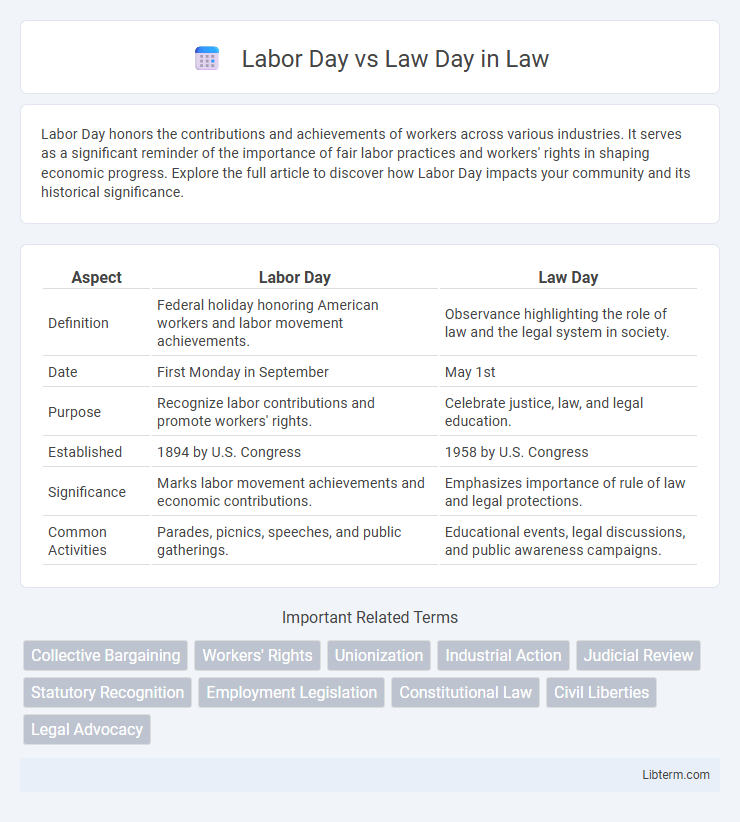Labor Day honors the contributions and achievements of workers across various industries. It serves as a significant reminder of the importance of fair labor practices and workers' rights in shaping economic progress. Explore the full article to discover how Labor Day impacts your community and its historical significance.
Table of Comparison
| Aspect | Labor Day | Law Day |
|---|---|---|
| Definition | Federal holiday honoring American workers and labor movement achievements. | Observance highlighting the role of law and the legal system in society. |
| Date | First Monday in September | May 1st |
| Purpose | Recognize labor contributions and promote workers' rights. | Celebrate justice, law, and legal education. |
| Established | 1894 by U.S. Congress | 1958 by U.S. Congress |
| Significance | Marks labor movement achievements and economic contributions. | Emphasizes importance of rule of law and legal protections. |
| Common Activities | Parades, picnics, speeches, and public gatherings. | Educational events, legal discussions, and public awareness campaigns. |
Introduction to Labor Day and Law Day
Labor Day, celebrated on the first Monday of September in the United States, honors the contributions and achievements of American workers and the labor movement. Law Day, observed annually on May 1st, recognizes the importance of the legal profession and the role of law in promoting justice and liberty. Both holidays emphasize distinct aspects of American society--Labor Day highlighting workers' rights and Law Day focusing on the rule of law and legal principles.
Historical Origins of Labor Day
Labor Day originated in the late 19th century during the labor union movement in the United States, aiming to recognize the social and economic achievements of American workers. The first Labor Day parade was held in New York City on September 5, 1882, organized by the Central Labor Union. It was later made a federal holiday in 1894 after the Pullman Strike highlighted workers' rights and labor reforms.
Historical Origins of Law Day
Law Day, established by President Dwight D. Eisenhower in 1958, commemorates the importance of law in the foundation of the United States and celebrates the role of the legal system in ensuring justice and equality. Its origins trace back to the G.I. Bill of Rights and efforts to promote understanding of legal heritage, contrasting with Labor Day's celebration of the American labor movement and workers' contributions since the late 19th century. Law Day emphasizes patriotism through education on the Constitution and the rule of law, marking a distinct observance separate from the labor-focused holiday.
Purpose and Significance of Labor Day
Labor Day honors the contributions of American workers and the labor movement, celebrating their achievements in improving workplace rights and conditions. Observed on the first Monday in September, it symbolizes the social and economic advancements brought about by organized labor. Law Day, celebrated on May 1, emphasizes the importance of the legal system and the rule of law in maintaining justice and democracy.
Purpose and Significance of Law Day
Law Day, observed on May 1st, celebrates the role of law in maintaining social justice, protecting individual rights, and promoting democratic freedoms, emphasizing the importance of understanding legal principles in everyday life. Unlike Labor Day, which honors the contributions and achievements of workers and the labor movement, Law Day highlights the significance of the rule of law as the foundation of a fair and just society. This commemoration fosters awareness about legal rights and responsibilities, encouraging civic engagement and respect for the judicial system.
Key Differences Between Labor Day and Law Day
Labor Day, celebrated on the first Monday of September, honors the contributions and achievements of American workers and the labor movement, emphasizing worker rights and labor unions. Law Day, observed on May 1st, focuses on the importance of the legal system in maintaining justice, promoting the rule of law, and educating the public about their rights and responsibilities under the law. The key differences lie in their themes: Labor Day centers on labor and economic progress, while Law Day highlights legal principles and civic obligations.
How Labor Day is Celebrated
Labor Day is celebrated with parades, barbecues, and public gatherings honoring the contributions of workers to the economy and society. Many businesses close, allowing employees to enjoy a long weekend dedicated to rest and appreciation of the labor movement's achievements. Communities often host festivals, concerts, and sporting events as part of the holiday observances.
How Law Day is Observed
Law Day is observed through educational programs, public discussions, and ceremonies that highlight the importance of the legal system in maintaining justice and democracy. Schools, courts, and civic organizations host events such as mock trials, debates, and lectures to deepen public understanding of constitutional rights and legal principles. This observance promotes civic responsibility and encourages citizens to appreciate the role of law in safeguarding freedoms and resolving disputes.
Labor Rights vs. Rule of Law
Labor Day celebrates the achievements and rights of workers, emphasizing fair wages, safe working conditions, and collective bargaining. Law Day honors the rule of law, highlighting the importance of legal frameworks that ensure justice, equality, and the protection of individual rights. While Labor Day focuses on labor rights and worker protections, Law Day underscores the foundation of civil society through laws that govern and protect those rights.
The Impact of Both Days on Society
Labor Day honors the contributions of workers and the labor movement, promoting awareness of workers' rights and economic progress. Law Day highlights the significance of the legal system in maintaining justice, democracy, and the rule of law. Both observances strengthen societal foundations by fostering respect for labor contributions and legal principles essential for social order and civic engagement.
Labor Day Infographic

 libterm.com
libterm.com